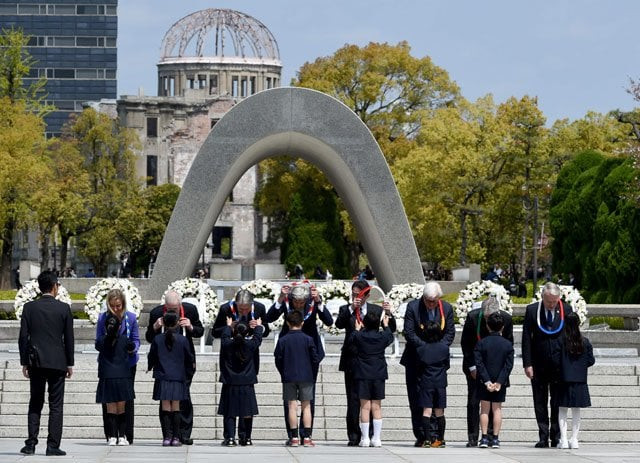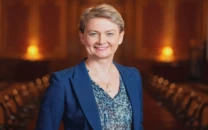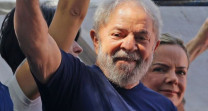Kerry pays landmark visit to Hiroshima atomic bomb memorial
Separately, a US official said flatly that Kerry would offer no formal apology over the August 1945 bombing

European Union High Represtntative for Foreign Affairs Federica Mogherini (2nd L), Canada's Foreign Minister Stephane Dion (3rd L), British Foreign Secretary Philip Hammond (4th L), US Secretary of State John Kerry (C), Japan's Foreign Minister Fumio Kishida (4th R), Germany's Foreign Minister Frank-Walter Steinmeier (3rd R), Italian Foreign Minister Paolo Gentiloni (2nd R) and French Foreign Minister Jean-Marc Ayrault (R) receive necklaces of paper cranes made by children after laying wreaths at the Memorial Cenotaph for the 1945 atomic bombing victims in the Peace Memorial Park, on the sidelines of the G7 Foreign Ministers' Meeting in Hiroshima on April 11, 2016. Kerry and other G7 foreign ministers made the landmark visit on April 11 to the memorial site for the world's first nuclear attack in Hiroshima. PHOTO: AFP
Kerry, who was accompanied by other G7 foreign ministers, is the highest-ranking administration official to pay his respects at the revered site of the World War II bombing -- the world's first nuclear attack.
Kerry seeks $742m in aid for Pakistan, Afghanistan
- Japan's Foreign Minister Fumio Kishida (R) presents US Secretary of State John Kerry with a replica of a letter on a friendly diplomatic matter from former US President Abraham Lincoln to the Tycoon of Japan in 1861, before their bilateral meeting on the sidelines of the G7 Foreign Ministers' meeting in Hiroshima on April 11, 2016. G7 foreign ministers on April 10 began two days of talks in Hiroshima, with John Kerry's visit to the atom-bombed city -- the first-ever by a US secretary of state -- overshadowing the broader agenda. PHOTO: AFP
Kerry's visit, and speculation that Obama may also go to Hiroshima, have prompted suggestions that Washington may be considering an official apology over the August 1945 bombing, which killed 140,000 people.
Kerry and other officials, however, have played down that expectation.
"My visit to Hiroshima has very special meaning about the strength of our relationship and the journey we have travelled together since the difficult time of the war," Kerry told Japanese foreign minister Fumio Kishida on Monday ahead of the memorial visit.
He added, "We will revisit the past and honour those who perished, (but) this trip is not about the past; it's about the present and the future."
Separately, a US official said flatly that Kerry would offer no formal apology.
"If you are asking whether the secretary of state came to Hiroshima to apologise, the answer is no," the State Department official, who asked not to be named, told reporters travelling with Kerry late Sunday.
Arriving under tight security, the G7 ministers and the foreign policy chief of the European Union started their visit at a museum that shows the devastating impact of the bombing -- such as survivors' burned clothing and other personal affects.
They then laid individual floral wreaths at a cenotaph in the leafy park next to the museum.
Many were killed instantly when the bomb was dropped, creating a firestorm that flattened swathes of the city. Thousands of others died later from severe radiation exposure.
John Kerry to visit Pakistan on Monday
On August 9, 1945, three days later, another US atomic bomb exploded over the city of Nagasaki, killing some 74,000 people. Less than a week later, on August 15, Emperor Hirohito announced Japan's surrender, ending World War II.
 US Secretary of State John Kerry (centre R) chats with Japan's Foreign Minister Fumio Kishida (centre L) as Germany's Foreign Minister Frank-Walter Steinmeier (L) and British Foreign Secretary Philip Hammond (R) look on, following a silent prayer in front of the Memorial Cenotaph for the 1945 atomic bombing victims in the Peace Memorial Park, on the sidelines of the G7 Foreign Ministers' Meeting in Hiroshima on April 11, 2016. Kerry and other G7 foreign ministers made the landmark visit on April 11 to the memorial site for the world's first nuclear attack in Hiroshima. PHOTO: AFP
US Secretary of State John Kerry (centre R) chats with Japan's Foreign Minister Fumio Kishida (centre L) as Germany's Foreign Minister Frank-Walter Steinmeier (L) and British Foreign Secretary Philip Hammond (R) look on, following a silent prayer in front of the Memorial Cenotaph for the 1945 atomic bombing victims in the Peace Memorial Park, on the sidelines of the G7 Foreign Ministers' Meeting in Hiroshima on April 11, 2016. Kerry and other G7 foreign ministers made the landmark visit on April 11 to the memorial site for the world's first nuclear attack in Hiroshima. PHOTO: AFPThe issue of the bombings is a highly emotive one in both Japan and the United States.
Japan, as the only nation to have experienced a nuclear attack, emphasises the suffering its people endured. But while publicly calling for the eradication of nuclear weapons, it has for decades been a close security ally of Washington under the protection of the US nuclear umbrella.
Many in the US, meanwhile, chafe at the suggestion of an apology, saying that Japan started the war with its attack on Pearl Harbor and argue that the atomic bombings hastened the war's end, thus preventing greater casualties.
In 2008, Nancy Pelosi, the then speaker of the US House of Representatives and third in the line of presidential succession, visited Hiroshima.
Kerry visits Iraq for talks on war against Islamic State
Among other G7 foreign ministers set to visit the memorial Monday are Britain's Philip Hammond and France's Jean-Marc Ayrault. It also marks the first time that top diplomats from the two nuclear-armed countries are visiting the city.
The group journey to the memorial comes as the ministers wrap up their final day of meetings with discussions focused on global hotspot issues including terrorism and other security threats as well as instability in the Middle East and elsewhere.



















COMMENTS
Comments are moderated and generally will be posted if they are on-topic and not abusive.
For more information, please see our Comments FAQ